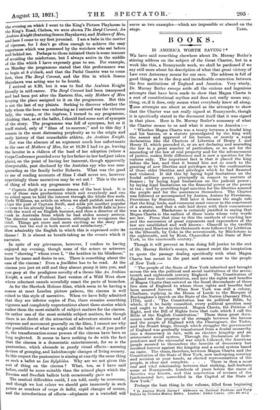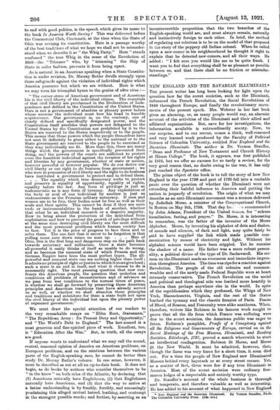BOOKS.
IS AMERICA WORTH SAVING ?* WN have said something elsewhere about Dr. Murray Butler's stirring address on the subject of the Great Charter, but in a week like this, a Runnymede week, we shall be pardoned if we say still more about his description of what that great victory of Law over Autocracy means for our race. The address is full of good things as to the deep and ineradicable connexion between the free institutions of England and America. Very wisely, Dr. Murray Butler sweeps aside all the curious and ingenious attempts that have been made to show that Magna Charts, is a sort of constitutional mythos and does not really mean any- thing, or, if it does, only means what everybody knew all along. Taese attempts are about as absurd as the attempts to show that the Charter was not really signed at Runnymede, though it is specifically stated in the document itself that it was signed in that place. Here is Dr. Murray Butler's summary of what the Charter means to us and what it means to America :- " Whether Magna Charts was a treaty between a feudal king and his barons, or a statute promulgated by the king with the assent and approval of his barons, or merely a royal declaration like the Charters of Liberties of Henry I. and Henry IL which preceded it, or an act declaring and amending the law in a great number of particulars, or an act for the amending of the law of real property and for the advancement of justice, makes little difference and is now a question for the curious only. The important fact is that it placed the king before the law, and that it bound him not so much to the granting of new liberties and privileges as to the confirmation of those older liberties and privileges which he had flaunted and violated. It did this by laying legal limitations on the feudal military power, principally in respect to matters of finance ; by laying legal limitations on the judicial power ; by laying legal limitations on the financial power or the power to tax ; and by providing legal sanction for the liberties assured the people and for the assurances themselves. The Charter was followed or accompanied by Assizes, Assizes by Provisions, Provisions by Statutes. Still later it became the single rule that the king, lords, and commons must concur in the enactment of a statute, and that a rule laid down with their concurrence was a statute. Blackstone is certainly justified in saying that Magna Charts is the earliest of those texts whose very words are law. From that time to this the methods of enacting law and the succession of great exponents and expounders of the law are established and well known : Glanvill in the twelfth century and Bracton in the thirteenth were followed by Littleton in the fifteenth, by Coke in the seventeenth, by Blackstone in the eighteenth, and by Kent, Chancellor of the State of New York, in the nineteenth century."
Though it will prevent us from doing full justice to the rest of Dr. Murray Butler's essays, we cannot resist the temptation to quote the passage dealing specifically with what Magna Charts has meant in the past and means now to the people of New York :—
" The people of the State of New York inherited and brought across the sea the political and social institutions of the seven- teenth and eighteenth century England. The Constitution of England was their constitution, and into the rights and benefits of Magna Marta they entered as the lineal descendants of those free men of England to whom those rights and benefits had been assured forever. When New York was still a colony, Chatham, replying in the House of Lords to the Marquis of Rockingham 's speech on tho State of the Nation (January 22nd,
1770), said The Constitution has its political Bible, by which, if it be fairly consulted, every political question may and ought to be determined. Magna Charts, the Petition of Right, and the Bill of Rights form that code which I call tho Bible of the English Constitution.' These three great docu- ments mark the progress of the struggle between the barons and the people of England with the Plantagenet, the Tudor, and the Stuart kings, through which struggles the government of England was gradually transformed from a feudal monarchy into a democracy in fact, with an elective kingship and an aristocratic social system. Through the Declaration of Inde- pendence and the successful war which followed, the American people assured to themselves the benefits of democracy but revolted forever against the kingship and a social system based on caste. The chain, therefore, between Magna Charts and the Constitution of the State of New York, now undergoing scrutiny and revision at your hands, as elected representatives of the people, is clear and complete. . . . There is then a most real and vital relationship between that striking, half-barbaric scene at Runnymede, hundreds of years before the name of America was known, and this convention of revisers of the fundamental law, assembled in the Capitol of the State of New York."
Perhaps the best thing in the volume, filled from beginning
• Is America Worth Saving f Addressee on National Problems and Party Policies by Nichol:la Murray Butler. Loudon : fisher 1.7uveln. Lies. 6d. net.) to end with good politics, is the speech which gives its name to the book Is America Worth Saving ? This was delivered before the Commercial Club, Cincinnati, at the time when the State of Ohio was revising its constitution. Here is a passage worthy of the best traditions of what we hope we shall not be misunder- stood when we describe it as " the Whig Party." Here " stands confessed " the true Whig in the sense of the Revolution of 1688—the " Trimmer " who, by " trimming " the Ship of State in sailor fashion, prevents it from being upset.
As is natural in an American speaking when a State Constitu- tion is under revision, Dr. Murray Butler dwells strongly upon those safeguards against the violation of individual rights which America possesses but. which we are without. Here is what we may term his triumphal hymn to the genius of ultra tires :- " The corner-stone of American government and of American life is the civil liberty of the individual citizen. Tho essentials of that civil liberty are proclaimed in the Declaration of Inde- pendence and defined in the Constitution of the United States. Ours is not a government of absolute or plenary power before whose exercise the individual must bow his head in humble acquiescence. Our government is, on the contrary, one of clearly defined and specifically designated power, and the Constitution itself provides that powers not delegated to the United States by the Constitution nor prohibited by it to the States are reserved to the States respectively or to the people. This means that those powers which the people themselves have not seen fit definitely to grant either to the national or to the State government are reserved to the people to bo exercised as they may individually see fit. More than this, there are many things which the government is specifically prevented from doing, and the powers of the courts are sufficient to protect even the humblest individual against the invasion of his rights and liberties by any government, whether of state or nation, however powerful or however popular. We do net derive our civil liberty or our right to do business from government ; we who were in possession of civil liberty and the right to do business have instituted a government to protect and to defend them. . . . The equality which true democracy seeks to protect and preserve is equality of opportunity, equality of rights, equality before the law. Any form of privilege is just as undemocratic as is any form of tyranny. Any exploitation of the body or soul of one individual by another is just as undemocratic as the Prussian military autocracy. If men and women are to be free, their bodies must be free as well as their souls and their spirits. This cannot be done if they are mere tools or instrumentalities in the hands of another, whether that other be an individual monarch or a despotic majority. How to bring about the protection of the individual from exploitation and bow to prevent the growth of privilege without at the same time destroying civil liberty are the most difficult and the moat persistent problems which human society has to face. Yet it is the price of progregs to face them and to solve them. The one fact that is never to be forgotten is that pulling some men down raises no man up. . . . Men of Ohio, this is the first long and dangerous step on the path back towards autocracy and militarism. Once a state becomes all-powerful it easily thinks of itself as unable to do wrong, and so becomes the unmoral state of which Prussia and the German Empire have been the most perfect types. The all- powerful and unmoral state can see nothing higher than itself ; it admits no principle of right or justice to which it must give heed ; such a state is an end in itself, and what it chooses to do is necessarily right. The most pressing question that now con- fronts the American people, the question that underlies and conditions all problems of reconstruction and of advance as we pass from war conditions to the normal times of peace, is whether we shall go forward by preserving those American principles and American traditions that have already served us so well, or whether we shall abandon those principles and traditions and substitute for them a state built not upon the civil liberty of the individual but upon the plenary power of organized government."
We must draw the special attention of our readers to the very remarkable essays on " Elihu Root, Statesman," " The Republican Army : Its Present Duty and Opportunity," and " The World's Debt to England." The last-named is a most generous and fine-spirited piece of work. Excellent, too, is " Education After the War." But, in truth, all the essays are good.
If anyone wants to understand what we may call the sound, central, reasoned opinion of America on American problems, on European problems, and on the relations between the various parts of the English-speaking race, he cannot do better than study Dr. Murray Butler's volume. In one sense, however, it must be described as not at all an up-to-date book. It dose not begin, as do books by authors who consider themselves to be " in the know " on both sides of the Atlantic, by declaring that (1) Americans naturally hate Englishmen, (2) that Englishmen naturally hate Americans, and (3) that the way to arrive at a better understanding is by frankly, forcibly, and unceasingly preelaimin,g this alleged mutual hatred, loathing, and contempt in the strongest possible words; and further, by asserting as an incontrovertible proposition that the two branches of the English-speaking world are, and must always remain, naturally and instinctively foreign to each other. In brief, the method of regulating our relations is to be on the model of that proposed in the story of the peppery old Indian coloneL When. he called upon a new-comer in his neighbourhood he thought it right to explain that he detested new-comers, and all their ways. He added : " I felt sure you would like me to be quite frank. I want you to feel that everything shall be as pleasant as possible between us, and that there shall be no friction or misunder- standings."



































 Previous page
Previous page